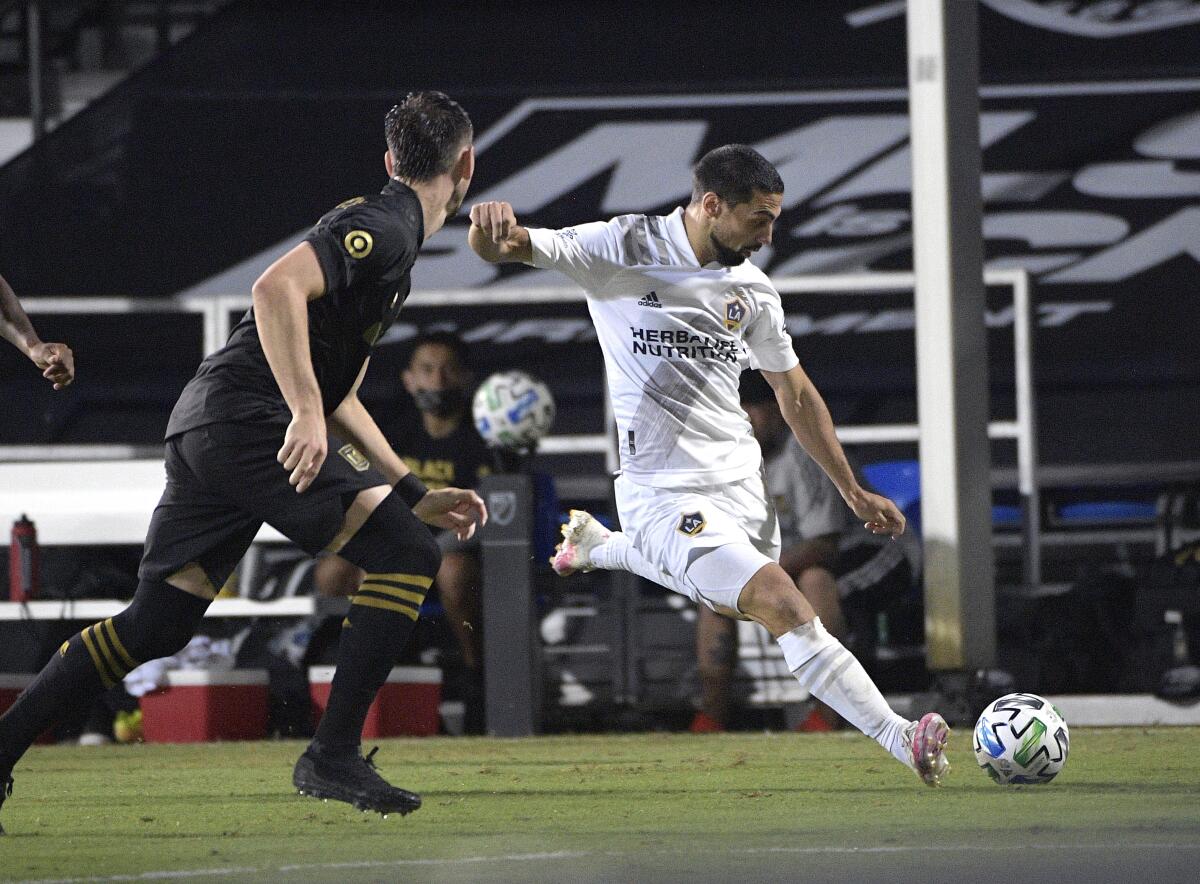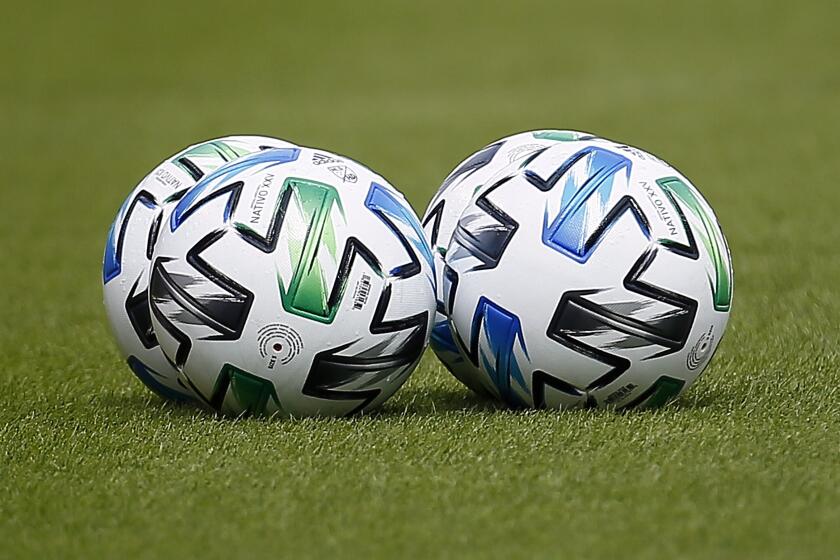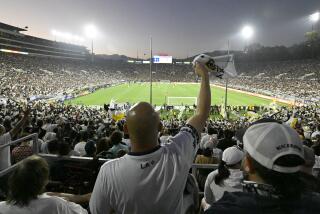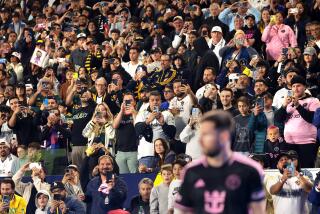MLS season to resume with LAFC and Galaxy meeting twice in five games

- Share via
Major League Soccer will resume its regular season Aug. 12 with its 26 teams playing in their home markets, the league said Saturday. And unlike the other four major professional sports leagues in the U.S., the MLS might allow fans back into their stadiums as well.
The revised MLS schedule, which is broken into phases, calls for teams to play at least 18 regular-season games between Aug. 12 and Nov. 8. The league was two weeks into its 2020 season when play was suspended in early March, and most teams played at least three times in the MLS Is Back tournament in Florida. Those five games will count in what will become a 23-game regular season.
The playoff field will be expanded to 18 teams, up from 14 last season, with postseason play beginning Nov. 20. The MLS Cup final is scheduled for Dec. 12, the latest date the league has played its championship game.
In the month-long first phase of the restart, which begins with Nashville playing FC Dallas on Wednesday, teams will play three home games and three away games against close geographic rivals, allowing teams to return home immediately after the matches. Travel will be by charter flights or on buses, and players and staff members will be tested for COVID-19 every other day in addition to the day before all matches.
LAFC will play at home against the Galaxy (Aug. 22), San Jose (Sept. 2) and Portland (Sept. 13) and on the road against Real Salt Lake (Aug. 26), Seattle (Aug. 30) and the Galaxy (Sept 6) in phase one. In addition to the two El Tráfico matches with LAFC, the Galaxy will play at home against Seattle (Aug. 26) and San Jose (Aug. 29) and on the road at Portland (Sept. 2) and San Jose (Sept 13).
The rest of the schedule will be released early next month.
The Galaxy returned to training Tuesday following a COVID-19 scare in which eight members of the team’s USL Championship affiliate tested positive.
In California, public gatherings have been banned with limited exceptions, and spokesmen for the Galaxy and LAFC said there are no plans to allow fans to attend any of their teams’ home games during phase one. But Commissioner Don Garber said the rest of the league will welcome supporters back in markets where local authorities will allow it, beginning with Wednesday’s game in Frisco, Texas, where more than 5,100 fans will be allowed into FC Dallas’ 20,500-seat stadium. Facial coverings will be mandatory and league approval, Garber said Saturday, is still pending.
“We are willing to work with our clubs if they’re going to abide by those guidelines to see if we could have [fans] attend our games,” said Garber, whose league’s largest source of revenue has been ticket sales. “Playing matches with fans, it’s a step towards some sense of what the new normal in sports is going to be. And we have to start, we’ve got to give it a try.”
MLS, along with all other U.S. sports leagues, suspended play March 12, just two games into its 34-match regular season. On that date a total of 1,323 Americans had tested positive for COVID-19 and 38 had died. The league will return to play this week with the U.S. averaging more than 60,000 infections a day and a COVID-related death every 70 seconds.
MLS, along with the WNBA, NBA, NHL and National Women’s Soccer League have had success resuming play in quarantine environments, with players and staff required to stay in a protective bubble where they are tested regularly for COVID-19. MLS’ five-week Florida tournament, which hasn’t reported a positive COVID test in nearly a month, will conclude Tuesday with Portland playing Orlando City in the final.
Dr. Anne W. Rimoin, a professor of epidemiology at UCLA and director of the school’s Center for Global and Immigrant Health, said stepping outside that quarantine bubble could be problematic.
“I do think it’s an issue,” she said. “You have people traveling all over the place to play games and coming in contact with each other. Just because you are an elite sports team doesn’t mean you don’t have to take the same precautions as everyone else.”
Major League Baseball and the USL Championship, a second-tier professional soccer league, appeared to prove that when both allowed their teams to travel to games beginning last month, with mixed results.
The St. Louis Cardinals have postponed 12 of their first 16 games and the Miami Marlins rescheduled eight of their first 11 after each team had more than a dozen players and staff members test positive for COVID-19. Eight other teams have also had games rescheduled as a result.
It still hasn’t played in a title game, losing in its playoff opener in 2018 and in the conference final last year while bowing out in the semifinals and quarterfinals of its only two U.S. Open Cups.
The USL Championship, the highest-ranking professional sports league in the U.S. to allow fans, saw eight players on Galaxy II recently test positive, leading to the postponement of more than a half-dozen games involving five teams.
Dr. Jared Baeten, vice dean at the University of Washington’s School of Public Health, said those missteps are a result of the leagues trying to do too much too soon.
“Sports are like every other business, trying their best to be optimistic about operating normally, then being surprised when optimism runs head-on into reality,” he said.
But Dr. Carlos del Rio, executive associate dean of the Emory School of Medicine, said it is possible for sports teams to resume play, even travel, if the players remain disciplined and follow the protocols regarding testing and social distancing.
“The major risk that I see is not what happens in the field but what happens outside the field,” he said. “MLS has worked fairly hard with the players to really educate them about the risks and the protocols and what they need to do.
“You really need the players to sort of pledge that they’re going to be using face masks, etc.. And if you do that, you’re going to be OK.”
Del Rio said MLS’ plan to avoid overnight stays for road games will help, but he worries about the decision to open stadiums to spectators, who are far less disciplined.
“The risk for the fans is there,” he said. “The biggest risk again may not be at the game. It may be what happens outside the game. What happens when people decide to go to the bathroom or go to the bar after the game.”
MLS faces other hurdles as well. With travel restricted between the U.S. and Canada, there have been no games scheduled for Montreal, Toronto and Vancouver. Those teams probably will play among themselves in phase one and then could be forced to temporarily relocate to the U.S. to continue the season.
Staff writer David Wharton contributed to this story.








